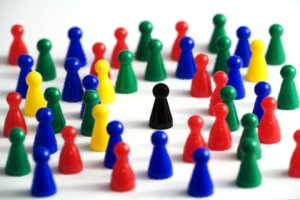
One of the things I want to accomplish with my blog is to really start opening up about myself. I have spent all of my life feeling misunderstood… by not only the people I interact with, but even friends and family. I have been alive now for almost half a CENTURY, and yet I feel like I have not done enough to define to the world who I am, what I believe in, and what I stand for.
I could let it all pour out right now and write my entire autobiography here, but not only would it take quite a while to write, it would also be an unbearably long and boring read.
So what I am going to do is, every so often, I am going to make a post that focuses on one facet of me. One part of who I am. A slice of me that’s a little more digestible in one sitting. Over time, the individual pieces taken together should make a fair representation of me… or at least that is my hope.
So for this inaugural entry I will start with an easy and obvious one: I am an introvert.
To my family and my close friends, this is not a surprising statement. But even those closer to me may not really understand what that means. An introvert is someone whose world is focused inward instead of outward… we live in the mind more than most people. We’re detail-oriented and introspective, and we thrive more in a less crowded environment.
I have heard others describe it very well: While extroverts receive their life energies by being out and around others, introverts expend this energy while being social, and recharge it with solitude (or with one or two people they really, really trust). We DO want to be around people; it’s just that we cannot be “on” all of the time and need our moments alone.
Introversion is something you are born to… it’s not something you develop later. It has to do with the way your brain is wired, the way your mind processes the world around you. There is nothing “wrong” with being introverted. In fact, many of the important artists, authors, scientists, and philosophers of history were introverts, as their situation allowed them to think deeper, analyze more, and explore all of the possibilities.
I remember that, even in my youngest ages, I was the happiest in my seclusion. I would spend an enormous amount of my time alone in my room on dizzying creative concepts. I drew detailed comic books that had complicated storylines. I recorded my own radio shows using two tape recorders and different voices so I could play various roles with overlapping dialog. I created room-sized city maps in which to drive my Matchbox cars around on. I absorbed all the books around me. I started reading at two years old, and by kindergarten I was reading at a third grade level.
But when the school tried to advance me a grade, I refused.
Why? Because I inherently knew that my social skills were not up to the task. I was beginning to deal with a much darker issue: Social Anxiety Disorder.
Social Anxiety is often connected with introversion: Nearly all who suffer from it are introverts, but not all introverts suffer Social Anxiety. It is a situation where a person is all too aware of themselves in social situations, and experiences great worry about judgment and rejection. It is shyness amped to the point of apprehension and fear.
Unlike introversion, Social Anxiety is something you develop. It can be caused by a number of different things. I cannot pinpoint exactly when mine started… but I got it pretty early. I suppose that, being so in the mind at such a young age, that I was not as ready with socializing in a large group as I should have been at that point. I was also smaller than my peers at the time, and my hand-eye coordination was well behind the curve. It was not long before the teasing and bullying started.
I was in shock: why was I tormented so much for being a little different? I was doing my best to fit in otherwise, so why was I being laughed at? I began to socially withdraw and found my solace by burrowing even further into my isolation.
Back in the day, my condition wasn’t really as recognized as it is now. My family understood it as being shy and withdrawn, but not anything beyond that. The only recommendations at the time anyone could give was to push through it… to force yourself to be extroverted and fight the fear.
Over all of my school years, elementary to high school, I would often try to push through the shell and put myself out in public view, usually through something intellectually or creatively oriented, but further punishment and ridicule would push me back in.
After high school, I purposely inserted myself in a few activities that required me to be among the masses in order to combat my anxiety. One of the things I did for many years was community acting, which I really loved doing and miss nowadays. I found it easy and enjoyable to adopt a bold persona, and I had hopes that the faux audacity would rub off a little. But when the performance was over, I would have to be me again, which is always the hardest role for me to play.
It may seem like a paradox… why should I have no difficulty projecting to a crowd of thousands but feel fear with a much smaller group? Because social anxiety preys on your self-image, and the less people there are, the greater the potential that the focus could be specifically on YOU. Even a crowd of one can seem greatly intimidating at times.
A very unfortunate aspect of my situation is that it often gives people the wrong impression of me. My fear to interact and be judged can easily be misconstrued as rudeness or arrogance, as if I’m too good to interact with others. The truth is entirely the opposite… I feel that I am NOT GOOD ENOUGH to do so. I hesitate to approach people independently. I avoid eye contact. I listen to everyone with interest and respect, but often fear that any contribution I make to the conversation wouldn’t be as witty or meaningful. My mind goes blank. I ‘m scared to death that I will come off as dull and uninteresting, and it invariably becomes true when I stay quiet. Even though I ‘m aware that these feelings are unfounded, it can be difficult to rationalize that logic in real-time. So while my avoidance is really due to panic, it may appear as conceit. I sincerely apologize if I’ve come off that way and offended anyone in the past – it was never my intent.
The one thing that weighs heavy on my mind, as I think about the countless times I have avoided uneasy social environments, is all of the chances I may have missed. A business opportunity? A lifelong friend? A soulmate? I may have been able to protect myself from pain and rejection, but have I also kept myself from additional joy? I will never know.
Even with all of the unease and aloofness, I would honestly say that I have only ever dealt with a moderate case of Social Anxiety. There are many, many others that have it far worse than I… to the point where it’s seriously debilitating and keeps them from actively participating in the world.
I have continued to work on myself over the course of my lifetime and, slowly, have softened the jagged edges of my fear. I am gradually learning to accept the introvert that I am, and to look at social occasions as goldmines instead of landmines. I am applying the skills of my past victories to the present, and hopefully to realize a better future. As the routine pitchman for my self-made business, I’m always selling my personal confidence to potential clients… and very often succeeding.
But I can still feel it there… still coloring decisions, still fomenting angst, still acting as a speed bump on my road through life. It will always be my greatest battle.
——————————
I have included a few links below that talk more about introversion and social anxiety. I would highly recommend them to anyone who has friend or family member that is an introvert, and ESPECIALLY those who experience the same anxiety symptoms. Understanding of Social Anxiety is far better at present, and it is important to get a handle on the treatment options as soon as it’s recognized.
Introversion
http://psychology.about.com/od/trait-theories-personality/f/introversion.htm
http://www.theatlantic.com/magazine/archive/2003/03/caring-for-your-introvert/302696/#
http://www.carlkingdom.com/10-myths-about-introverts#.VPTcIfnF98E
Social Anxiety Disorder
http://www.webmd.com/anxiety-panic/guide/mental-health-social-anxiety-disorder
http://www.childmind.org/en/health/disorder-guide/social-anxiety-disorder
http://www.socialanxietysupport.com/disorder/

Your entry about your experience in dealing with Social Anxiety Disorder is eye-opening. Can you imagine how many people around us do not desire to understand this struggle many introverted people deal with, and how overlooked this affliction is? As I read the words INTROVERT, I thought with ease and nonchalance that I know what that word means, but that wasn’t true and I needed to keep reading. I caught, “We live in the mind more than most people…” and “….focused inward instead of outward.” and I was schooled.
I have struggled with bipolar disorder, and that had a lot of challenges, but your school days sounded even harder and longer due to the impact of others’ ill-acceptance of you. You were only expressing your natural self like everyone else. It is painful, the effect of others’ ridicule. Isn’t it fascinating how shallow one’s counterparts are, after all the allowances you personally make for others, never receiving anything good in the reciprocal? People disappoint, indeed, with their lack of acceptance and understanding.
It was also very interesting to hear about how your family reacted.
You definitely deserve a huge break from the struggle; You are dedicated, and you continue to cope with something that resulted in the need of an immense amount of inner strength through pain. However, it resonates with me, and I hope you, that it should be said that one should not have to change who they are. How many of us can say that we feel confident with that statement, in a world where social human practices just seem to dictate that you need to be similar to them?
Lee, you have made tremendous strides and I have never found you boring or withdrawn. We all have our trials that make life difficult – some just do not admit it. I used to be shy and had little self confidence. Going back to church in ’98 changed me. I remembered how I used to feel invisible there when I was a member at the same church 28 years ago and stopped going after a while. When I returned I made it a mission of mine with the Lord’s help to seek out those who were new, alone, seemed shy, or in need. That gave me confidence that I had a purpose at church. Helping others helped me, too. Now I am really outspoken and free. I just have to be careful that I do not steam roller those who prefer to stay alone or not receive one of my all to frequent hugs. I feel like a ball of love and kindness – there for those who need some. I am here for you anytime just call.
It is good that you are sharing your feelings, etc. That is a step in a positive direction. You are more precious than you sometimes realize, please do not ever forget it. If you need reminding give me a call anytime 24/7. Love you.